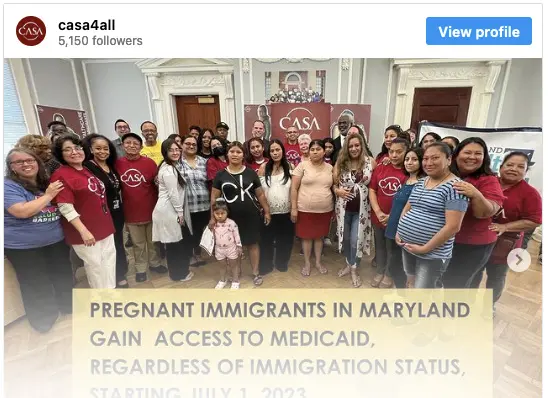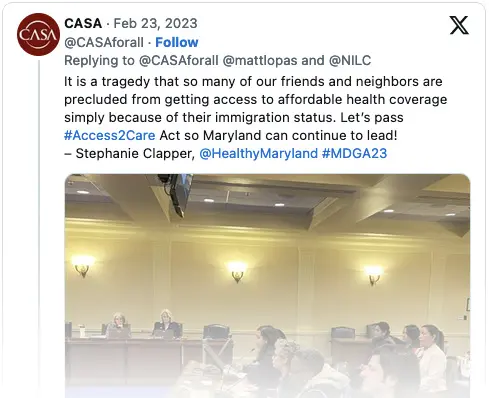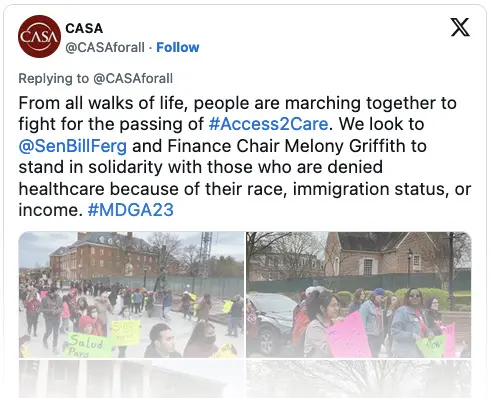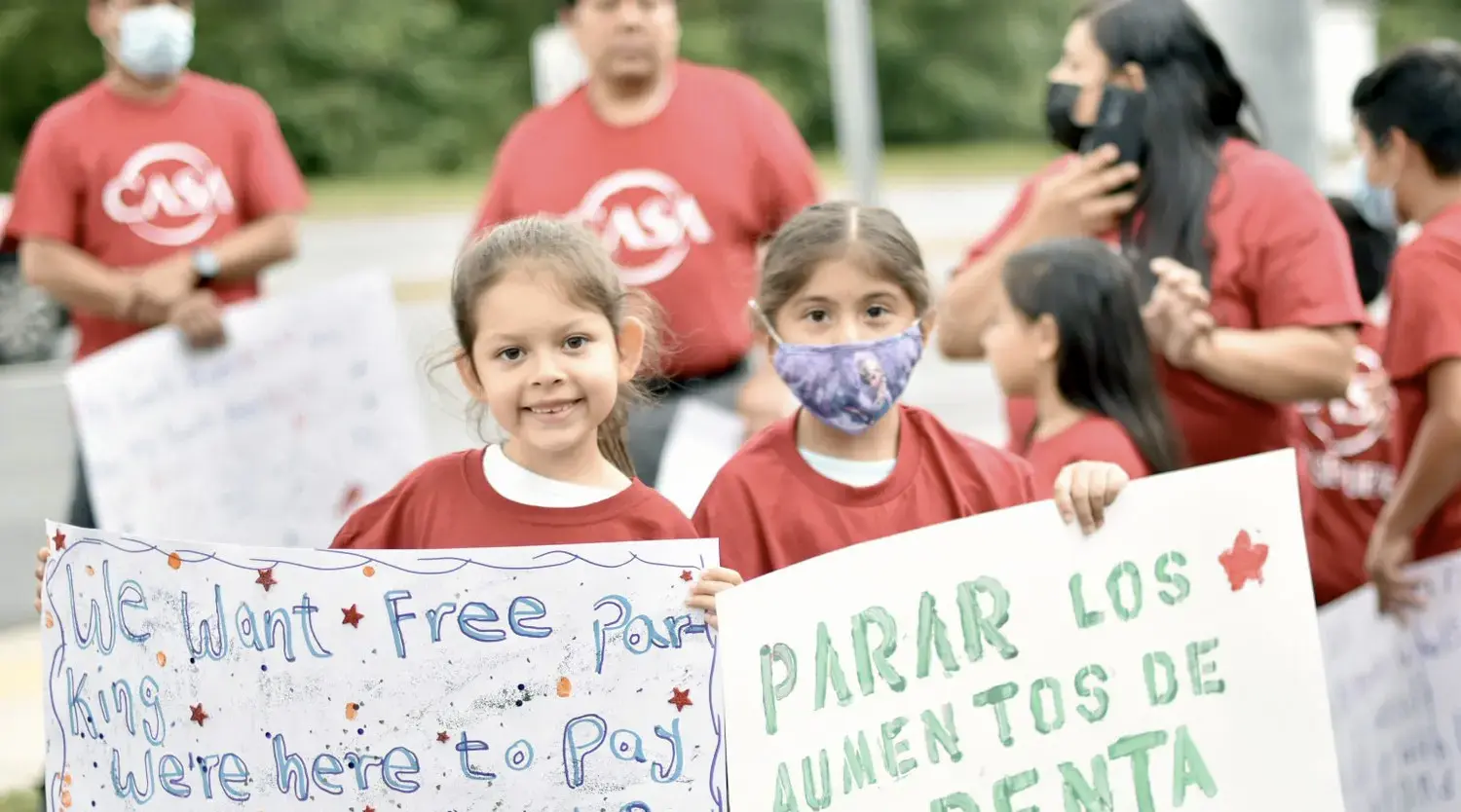
2023 Annual Report


Healthcare is both a fundamental human right and a central focus of CASA’s advocacy efforts aimed at enhancing the lives of immigrant and working-class communities. Currently, undocumented immigrants in the U.S. contribute significantly through taxes and societal contributions but are unjustly excluded from health insurance coverage. CASA is actively addressing this life-threatening gap through a multifaceted approach.
The Healthy Babies Equity Act
CASA spearheaded the successful passage of the Healthy Babies Equity Act, which received approval from the Maryland General Assembly in 2022 and became effective in July 2023. This groundbreaking legislation extends Medicaid enrollment to all income-eligible pregnant Marylanders, irrespective of their immigration status. This vital change will ensure that 6,000 pregnant Marylanders annually, regardless of their immigration status, receive medically necessary care. The impact of this care will be transformative, safeguarding the lives of both children and their mothers.
The achievement of passing this legislation was made possible through the unwavering dedication of community members and immigrant mothers who courageously stood up against healthcare injustices and demanded equitable care. Since the expansion of Medicaid, more than 2,900 immigrant parents have already enrolled in the program.
The Fight for Access to Care
The persistent challenges of healthcare access and affordability have disproportionately impacted Black and brown communities for decades. At present, more than 300,000 undocumented residents in Maryland are excluded from state health insurance coverage. Consequently, CASA remains unwavering in its commitment to securing quality and affordable healthcare for all Marylanders, regardless of immigration status. Our ongoing efforts include advocating for the Access to Care Act, which, if enacted, would enable undocumented immigrants in Maryland to purchase insurance through the Health Benefit Exchange.
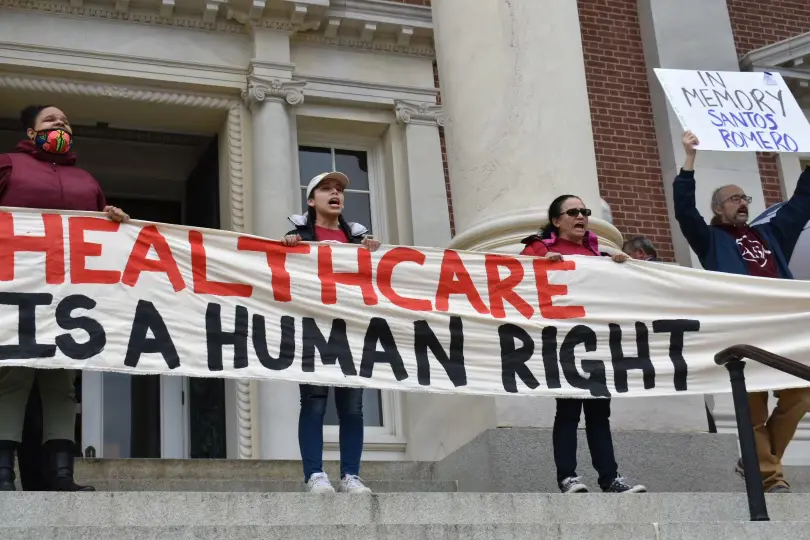
During the recent legislative session, the Maryland House of Delegates successfully passed this bill, and CASA is now diligently working to ensure its passage through the full legislature. We are dedicated to expanding healthcare access and strengthening public and political support for comprehensive healthcare coverage.

This year, CASA reaffirmed its steadfast dedication to securing affordable housing for immigrant and working-class families. CASA’s membership exerted considerable pressure on elected officials in Virginia and Maryland to combat the challenges posed by gentrification and the soaring housing costs in our nation. Eight of CASA’s Tenant Committees demonstrated remarkable resilience and commitment by spearheading a comprehensive rent stabilization campaign, resulting in significant policy victories. These accomplishments include the implementation of temporary rent stabilization in Prince George’s County, the establishment of permanent rent stabilization in Mt. Rainier with some of the most robust language in the nation, the successful establishment of permanent rent stabilization in Hyattsville, and the extension of permanent rent stabilization to encompass all of Montgomery County.
Moreover, this year has seen remarkable housing successes. CASA’s housing legal team has significantly expanded from one attorney to four, with three additional support staff. This expansion has allowed CASA to represent hundreds of tenants in eviction defense proceedings throughout Montgomery and Prince George’s counties as well as Baltimore City this year. Our representation has revealed the wide range of illegal conduct that many tenants face, from horrendous conditions such as rats and bedbugs to unlawful junk fees adding up to thousands of dollars for a single tenant. In February 2023, organizers and the legal team joined forces to put a stop to rent increases above Hyattsville’s 3% cap that our members fought to pass. During that endeavor, CASA attorneys discovered that a landlord, in addition to raising rents above 3%, had not obtained a proper license. The landlord agreed to rescind the tenants’ rent increase notices for another year.
CASA is also on the front lines advocating for tenants’ associations organized by CASA organizers. For years CASA has been organizing at a complex in Riverdale, Maryland, where tenants face ongoing issues with pests, security, and a lack of heat and hot water. This summer, CASA filed nearly two dozen rent escrow actions against the landlord and asked the court to order repairs. As the case winds through the winter, the tenants’ association refuses to give up until they have a safe, habitable home.
Lifted by the momentum generated by these successful actions, and the broader tenant rights movement, CASA is actively working to enact stronger eviction protections, enhance enforcement regarding subpar living conditions, and institute safeguards against excessive rent increases in various jurisdictions and statewide.

In 2023, CASA demonstrated an unwavering dedication to the cause of Climate Justice. This commitment is one of CASA membership’s highest issue priorities and an essential part of the broader pursuit of Social Justice, Racial Justice, Economic Justice, and Immigrant Justice.
Climate Justice Trainings & the Climate Justice Fellows
This past year, we introduced the first cadre of Climate Justice Fellows. The Fellows have been learning about climate justice issues, organizing mobilizations, receiving leadership development, collecting testimony on the effects of climate justice on members’ lives, and participating in training and meetings with our Leadership Boards, members, and CASA staff. They have also spread their awareness among the general membership in their communities; thanks to the work of our Fellows and our Climate Training Manager, 100% of our current members have received such climate justice education. In addition to CASA’s cohort of 14 Fellows from our core states, plus four National Members from across the country, CASA spread its knowledge to several smaller partner organizations as part of our Incubator Program.
As leaders of CASA, Climate Justice Fellows also took on leadership roles in the development and implementation of CASA’s climate justice campaigns. Virginian Fellows Karla Urrutia and Ana Hernandez attended actions and spoke during press conferences to ensure that Virginia remains part of the Regional Greenhouse Gas Initiative, which directly funds flood resilience projects and energy efficiency programs in low-income housing. Karla organized community members to support the local campaign of safe streets to promote pedestrian safety and advocate for equitable transportation options that will reduce emissions and air pollution in their communities.
Meanwhile, Fellows in Maryland advocated for the passage of the Transit Equity Act and Climate Solutions Now, sharing testimony during press conferences and lobbying legislators. In Pennsylvania, Fellow Estrella Lopez acted as a spokesperson for the significant home retrofitting legislation that passed in the state. Finally, fellows across CASA’s footprint came together to support the launch of CASA’s federal campaign of TPS for Central America.
CASA’s fight for TPS for Central America is crucial, in part because of the recent natural disasters that have impacted those countries of origin. Many CASA members have been displaced by climate disasters that led to their eventual immigration to the US to seek opportunity. The number of people from Latin American and African countries due to climate change will only continue to rise. CASA is fighting for the US to recognize this climate reality and provide legal pathways for current immigrants who are unable to return and for future flows of immigrants impacted by climate change.
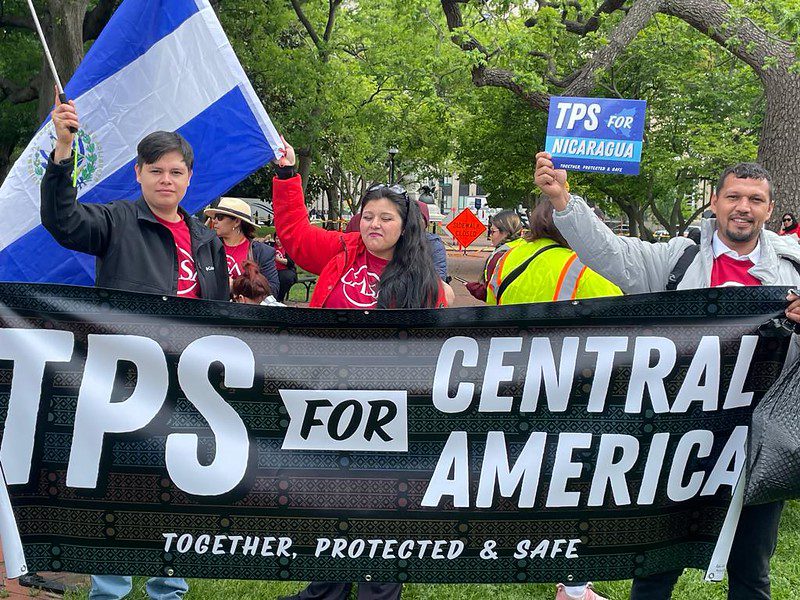
Climate Solutions Now–Passage & Beyond
In our last Annual Report, CASA celebrated the passage of Maryland’s Climate Solutions Now (CSN) Act, the country’s most advanced state-level climate legislation to date. However, passage of critical legislation is only half the battle–now we must ensure that the new benefits serve all communities, not just a select few.
To that end, CASA has joined a coalition with the Sierra Club of Maryland, consisting of several critical Climate Partners, to increase community access to the CSN’s resources. CASA has mobilized members to in-person actions in Annapolis and in Montgomery County, has convened members at town halls to discuss building electrification and its benefits, lobbied directly with State Representatives and the Maryland Department of the Environment on the importance of equity in climate justice progress, and queried members on their personal issue priorities–which include building electrification and climate labor equity.
Local Progress
CASA and its members know that grassroots organizing is the key path for civic progress in this country. Climate justice is no exception, and our local committees are constantly working to ease the burden of climate change on our members’ lives.
In late 2022, the Montgomery County Council unanimously voted to pass the Comprehensive Building Decarbonization Bill (Bill 13-22), which requires the County Executive to issue all-electric building standards for new construction projects by 2026. For months before the bill passed, impacted CASA members testified and rallied in support of Bill 13-22 alongside several climate organizations to bring the legislation to the finish line.
Simultaneously, CASA has worked closely with the Baltimore Transit Equity Coalition in Maryland to devise a comprehensive plan for expanding the Red Line to ensure more equitable transit options. Similarly, CASA has actively engaged in local- and state-level transit-equity campaigns in Fairfax, Manassas, and Richmond, as well as defending the commonwealth’s participation in the RGGI greenhouse-gas reduction structure.
Meanwhile, our Pennsylvania members have been advocating and will continue to advocate for the retention and expansion of funding to the commonwealth’s pivotal Whole Home Repair program. This program will allocate $125 million to small landlords and low-income homeowners for climate resilience in housing. This is the first program of its kind in the nation and serves as a model of preserving aging housing while training and creating a local workforce with family-sustaining jobs. In addition to advocating for the expansion of state funding for this program, CASA’s efforts to connect our members to these newly funded green-sector jobs have already started to create an impact in our community.

See the previous “CASA & the Workforce” section for more details.
Overall, these climate campaigns address pressing needs in the CASA members’ communities, including safety and access to economic opportunity through increased and more reliable transit systems.

Lancaster Trust Act
CASA spent much of 2022 fighting for the prospective Lancaster Trust Act, which proposes to increase the safety of all people living in Lancaster City, Pennsylvania. Where officials collaborate with ICE, trust between officials and the community is jeopardized, threatening the public safety of everyone living in the area. The Lancaster Trust Act, if passed, would cultivate a positive relationship between city officials and the immigrant community by specifically preventing law enforcement from inquiring about immigration status, detaining people on behalf of ICE, allowing Lancaster City employees and officials to accept photo IDs issued by nonprofit organizations, and providing Lancaster citizens reassurance to report domestic violence situations and other crimes without fear of their information being shared with ICE.
While the April 11 and April 25 Lancaster City Council meetings allowed time to discuss the bill, the City Council on May 9, 2023, chose only to recertify as a Welcoming City for immigrants but still needs to take the next step to pass this bill.
CASA’s unwavering commitment to empowering immigrant communities and fostering a culture of inclusivity is at the heart of the Lancaster Trust Act fight. By championing provisions that prevent law enforcement from inquiring about immigration status and detaining individuals on behalf of ICE, CASA has been a driving force in rebuilding the frayed trust between officials and residents.
This pivotal legislation would safeguard vulnerable community members and lay the foundation for a harmonious coexistence between immigrants and local authorities. In the next fiscal year, we will continue fighting for Trust Acts to protect immigrant communities.
Meanwhile, Pennsylvania members have been advocating and will continue to advocate for the retention and expansion of funding to the commonwealth’s pivotal Whole Home Repair program. This program will allocate $125 million to small landlords and low-income homeowners for climate resilience in housing. This is the first program of its kind in the nation and serves as a model of preserving aging housing while training and creating a local workforce with family-sustaining jobs. In addition to advocating for the expansion of state funding for this program, CASA’s efforts to connect members to these newly funded green-sector jobs have already started to create an impact in our community.
CASA’s integral role in closing the Berks County Detention Center shows that our influence extends beyond legislative victories. For eight years, CASA has been at the forefront of the ‘Shut Down Berks’ Coalition—a collective effort uniting immigrants, advocacy organizations, and allies. The success of this coalition, which has culminated in the center’s closure, showcases CASA’s capacity to mobilize communities, effect systemic change, and end the mistreatment and abuse faced by immigrants.
On January 31, 2023, Berks County Detention Center was finally closed. This effort was led by the ‘Shut Down Berks’ Coalition, consisting of the immigrant community of Pennsylvania, immigrant advocacy organizations such as CASA, and our allies. This eight-year, people-powered campaign began in 2015 after the tragic case of an 18-year-old mother being sexually assaulted at Berks County Detention Center. Community members made it their mission to close this detention center, whose long history of abuse and violence has long mandated its shutdown. The closing of Berks County marks the beginning of future campaigns to end the detention and dehumanization of immigrants within other prisons as well.
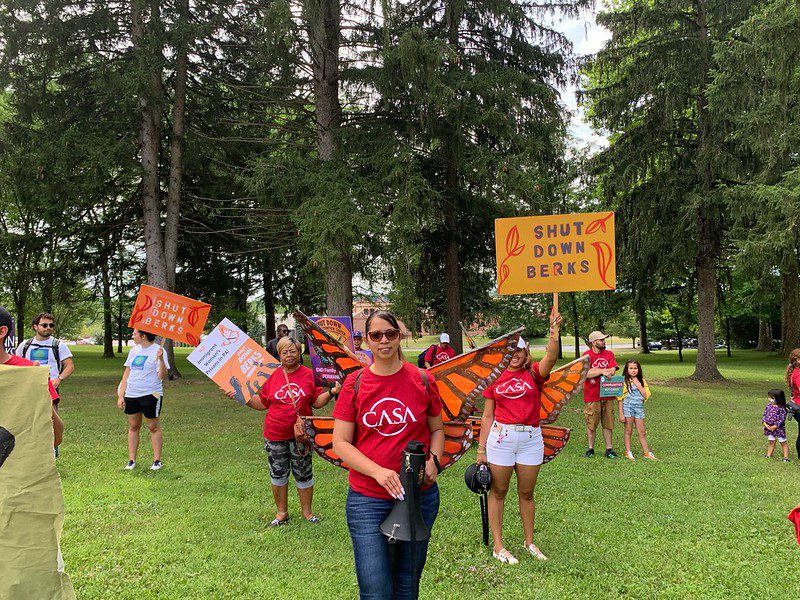

National Membership Growth
CASA’s national membership has continued to grow over the last year, and we are happy to welcome our new members to CASA. By the end of fiscal year 2023, CASA boasted 4,367 National Members across forty-six US states and Puerto Rico. We have continued our commitment to our national members by offering many services virtually to support people living in states without CASA centers.
It’s critically important for CASA that our national membership carries the same benefits as membership in one of our four core states. Ultimately, CASA membership grants expanded legal protection, political education, and skills training for members, no matter where they are in the United States.
National Member Priorities
Our strategy to transform this nation and win immigration reform and other extraordinary victories depends on CASA members building power.
Two years ago, after opening our fourth core state of Georgia and the massive growth of our national membership program, CASA was proud to announce that we had grown into a truly national organization. During this past year, we continued to build the infrastructure we need to increase our national impact while never losing our local, grassroots power. With this infrastructure in place, CASA members organized a National Assembly, where elected representatives from various committees gathered to set the major priorities for CASA. This is a key step—creating a formal member assembly, as CASA does with member committees in our core state geography, allows national members to fully participate in CASA’s internal member democracy process, helping to identify organizational priorities and campaigns.
The first and most important priority for CASA members across the country continues to be winning immigration reform. In January of 2023, CASA members voted to focus their efforts on winning Temporary Protected Status (TPS) for Central America. CASA members joined with allies across the country to help lead the fight for TPS and continued to organize their local communities in support of this major priority.
The second priority that CASA members identified as essential was access to healthcare.
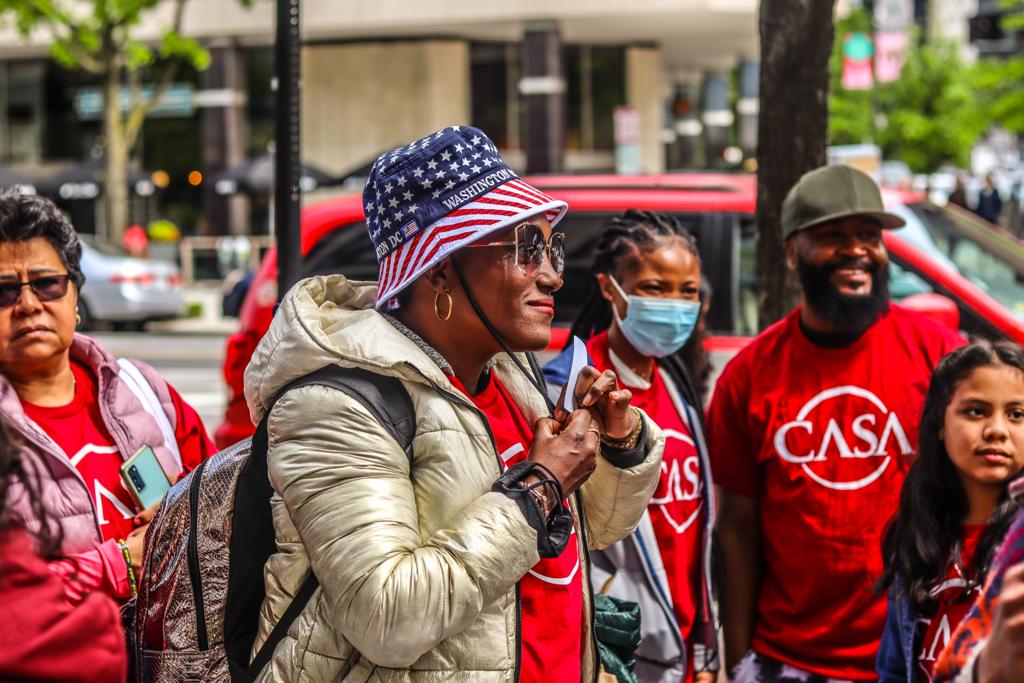
The COVID-19 pandemic intensified the massive disparities that working-class immigrant families face when seeking healthcare and the importance of fighting for reforms to allow immigrants to access health insurance.
The third major priority, as we continue to see record weather events, is climate justice. CASA members highlighted the need to have BIPOC and immigrant leaders in the climate justice movement and joined a number of national coalitions that are working to fight climate change and supporting a just transition where the most affected communities are able to find new opportunities in a green economy.
True to CASA’s model, we continued our commitment to also serving our national members, piloting a number of new remote services like ESOL classes and remote legal services so that we could support CASA members even in places where we don’t have offices.
